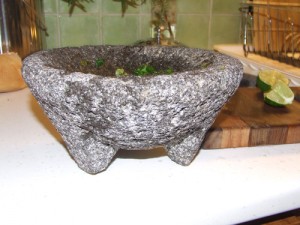by David Cecelski
Tonight I’m all excited because my sister and her husband just gave me my first molcajete, one of the most important cooking tools in a Mexican kitchen. Molcajetes are heavy stone bowls that stand on three legs. They’re used like a mortar, in combination with a tejolote, a sizeable stone pestle.
Molcajetes are typically made out of black basalt mined from the volcanoes around Mexico City. They’re big and heavy—mine weighs 8 pounds. For thousands of years, they’ve been used for grinding spices and herbs and for making sauces and salsas.
For convenience sake, growing numbers of Mexican cooks use electric blenders instead of molcajetes. But my brother-in-law, who is from the Mexican state of Guanajuato, says that most cooks still recognize the superior value of a well-seasoned molcajete for blending and bringing out flavors.
Swathed in soft cloths, molcajetes arrive here every day now, carefully tucked under arms or gently packed in suitcases or duffle bags. For our new Mexican neighbors, they’re literally a little piece of their homeland that has come here with them: out of the country’s volcanic soil, they bring the flavors and aromas of kitchens that are now a thousand miles away.

Leave a Reply